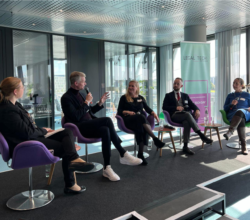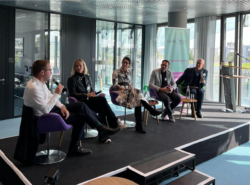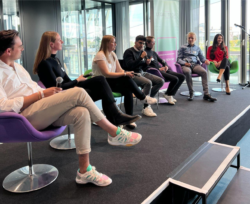The legal tech industry in Germany has grown a lot – and come of age. This was clearly demonstrated at the first Legal Tech Day 2022. At the end of September, the association invited its members and selected guests to the industry get-together in Berlin.
Three topics were on the agenda at the Legal Tech Day: the digitization of the judiciary, the attractiveness of investing in legal tech, and the war for talent. The event was fully booked. In total, more than 120 participants came to exchange ideas and network on the topics of the industry. Among the guests were law firms, legal protection insurers, legal departments as well as technology companies and
management consultancies. Representatives from politics and the press were also present. The quality of the panels and accompanying discussions showed the stage the legal tech industry is at. It has long since outgrown its infancy and legal tech is no longer a buzzword. Instead of talking about the distant future or potential dangers, experience values were exchanged and new cooperation opportunities were discussed. Our conclusion: The legal industry has long since recognized the potential of legal tech – fear of contact is a thing of the past!
Digitization of the judiciary

Panel 1: Digitization of the judiciary (from left to right: Kathrin Helling-Plahr, Lars Zimmermann, Sina Dörr, Dirk Hartung, Corinna Budras)
In the panel on the digitization of the judiciary, Dirk Hartung from Bucerius Law School attested to a mood of change in Germany and appealed to those responsible “The study shows – doing nothing is not an option”! Together with the Boston Consulting Group (BCG) and Bucerius Law School, the Legal Tech Association Germany had published an international study on the digitization of justice in June of this year. The conclusion for Germany: we are more than 10 years behind in digitization. This was the result of a comparison with pioneering nations such as Singapore, Austria, Great Britain and Canada. Moderated by Corinna Budras of the Frankfurter Allgemeine Zeitung, the discussion with FDP politician Katrin Helling-Plahr and judge Sina Dörr focused on concrete challenges and approaches to solutions. The focus of the discussion was always on looking to the future. Lars Zimmermann from GovTechCampus gave important impulses on how the federal and state governments could work together more efficiently in the future. At the end, everyone agreed: “The time is now!”.
Invest in Legal Tech

Panel 2: Invest in Legal Tech (from left: Dr. Jörn Eschment, Philippa Peters, Dr. Birte Gall, Dr. Philipp Hammerich, Markus Hartung).
The second panel was opened by a keynote speech by Esra Limbacher (SPD, Member of the German Bundestag) on “Investing in the Legal Market.” “Legal tech builds bridges between business, the judiciary and citizens” said Limbacher. He also appealed to his own ranks: “Members of parliament need to think along and enable.”
The second panel then continued with a practical approach. Markus Hartung moderated and questioned the panelists on the topic of new business models. Founders Philippa Peters of Fides and Birte Gall of Erblotse reported on how they obtained their funding rounds. Dr. Jörn Eschment from Burford Capital
clarified what regulatory challenges there are when investing in German legal techs. These often make it difficult for legal tech startups to convince investors. Dr. Philipp Hammerich from rightmart Rechtsanwaltsgesellschaft mbH drew attention to the still insufficient legal certainty for legal tech companies. Furthermore, Hammerich encouraged all future founders:inside to “Just be brave and dare to look at the world!”
War for Talents

Panel 3 “War for Talents” (from left: Sebastian von Glahn, Felipe Molina (center) and representatives of various student legal tech initiatives)
The third panel “War for Talents” was designed by the student partners of the Legal Tech Association Germany. Under the leadership of Felipe Molina Gaviria (rightmart), six talents discussed with Sebastian von Glahn from Talent Rocket about ideal employers and starting salaries. The discussion was characterized by absolute openness and was actively shaped by the audience. From
HR professionals, large law firms to small companies – everyone joined in the discussion. The talents on stage helped to understand what is important to the next generation of lawyers in a job and what demands they bring with them at the same time. The lively reactions in the audience showed that there is still a lot to be said here. The topic of “young talent” remains a real challenge for the industry!
Outlook
The Legal Tech Day convinced on the one hand by the fantastic speakers and entertaining panels. But also by the atmosphere among the participants and during the breaks. Throughout the event, people exchanged ideas on an equal footing – regardless of career level and specialization. The location was also convincing. With a direct view of the Reichstag building, the association made a statement in terms of political proximity. The event ended on the rooftop terrace and with a view to next year, when the Legal Tech Day will enter its second round.
(The board of the Legal Tech Association with management gathered above the rooftops of Berlin for the final photo). f.l. Alisha Andert, Alkan Dogan, Antonia Pape, Maraja Fistnic, Dr. Valesca Molinari, Philipp Hammerich and Managing Director Valerie Keilhau)



